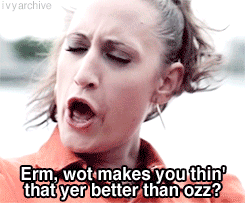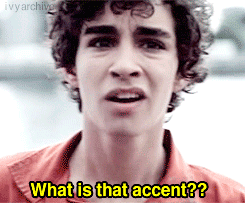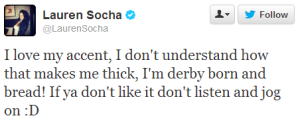As a society, we’re getting better at not being dicks to each other. It’s a slow progression, but some hurdles have been royally leapt: women can vote, homosexual couples can adopt, and ethnic minorities legally have access to the same goods and services as everybody else. Of course, we still deal with individual douche-canoes mouthing off at people because of their sexuality, gender identity, race, ability, age, body shape or a million other things; institutionalised prejudice hasn’t been eradicated; and prejudice is still enacted on a micro-level, often not from a malicious footing, but as the product of a society still breaking free of intolerant belief systems (that blasted patriarchy!). I’ve painted a cheery picture there, haven’t I? … but in general, while things are by no stretch of the imagination fixed, in most ways they’re getting better, and we’re a lot sounder to each other than we used to be.
Not, I would argue, when it comes to class. Class is something of a dirty word these days – we’re either too embarrassed to talk about it (“How gauche! To talk about money and social positions!”), or we believe we’ve superseded it (“We’re all middle class now”, came the cry from the New Labour camp upon election in 1997). I’m afraid that’s bollocks. While we still have caricatures of ‘chavs’ on television; while the richest 1% of people in the UK have as much wealth as 60% of the rest of the population combined[1]; while we still have benefit recipients universally derided as ‘scroungers’ in the mainstream press (and in opinion polls), we still have a class system in place, whether we’re talking about it or not. While I don’t think there should be a class system in place, ignoring that we have one isn’t going to make it go away.
There are many ways in which class judgements can be articulated, the majority of which I am not in any way well versed enough to write on[2] – but one of the ones I might be is language policing. That chavs don’t talk proper, innit. As with the majority of my blog posts, this one comes complete with OPINIONS and FEELINGS – you’ve been warned.
I reckon language and accent mockery and judgement is one of the last bastions of acceptable, overt prejudice. People mock each other’s accents all the time, in conversation, on television, and in print. Comments about people’s accents are often just a euphemism for class-based prejudices it would be improper to state more bluntly. “That woman sounds like she’s poor and ill-educated” – no. “She’s got a common, chav accent/Scouse is a horrible accent/she’s not even speaking English” – these are the kind of things you hear quite frequently. Mocking someone’s language is a helpful euphemism – a linguistic fig leaf, if you will – allowing shitty judgements and belief systems to go relatively unchallenged.
However, highlighting someone’s linguistic prejudice is often greeted with accusations of being oversensitive, and talk of “accent prejudice” followed by scoffs and eyerolls. I can understand it – it doesn’t seem as severe as other douchebaggery, and in a real sense it’s probably not. But it does matter.
I hear the same excuses over and over:
1. “But it’s only an accent!” Accents are far, FAR more important than you might think when it comes to Getting On. Yes, we live in an age where BBC newsreaders aren’t restricted to a certain type of accent, and public figures like Professor Brian Cox, Paddy McGuiness and John Bishop (sporters of Mancunian, Lancashire and Liverpudlian accents respectively) are frequently featured on primetime. But if we’re more accepting of regional and multicultural accents, why are elocution lessons still on the rise? Although many carry a positive connotation (hence the choice to house many call-centres in Newcastle-upon-Tyne, the accent being widely considered to be a friendly and approachable one), non-standard accents still carry an awful lot of stigma.
A damaging amount, actually. Even the most recent of studies – which led to ITV dedicating a Tonight programme to the issue – show that people still judge regional accents, with 28% of respondents feeling discriminated against because of their accent, and 80% of employers surveyed admitting to discriminating on the grounds of accent[3]. Previous studies have seen a person considered to be “significantly more guilty” of a crime having given evidence in a Brummie accent, compared to giving the same evidence with a Southern accent [4]. Likewise in the States, one researcher placed calls to landlords in white, African American and Latin American English accents, finding the latter two invited far more discrimination in finding housing[5]. This isn’t fiddle-faddle – people honestly think, in a simulated court of law, that a person is more likely to have committed a crime if they speak in a Birmingham accent – not based on the content of their speech, but how it’s pronounced. That’s not only bonkers, it’s a bit scary. Accent judgement has a real, tangible effect on people’s lives.
2. “But it’s just my opinion!” Yes, it’s your opinion, but it sucks. Other prejudices can’t be absolved by people just adding “…in my opinion” to the end. When some terrible homophobic member of congress says that gay couples shouldn’t be allowed to marry because they are a threat to children and it will result in homosexuality being taught in schools (before drunkenly crashing his boat into a bunch of kids [6]), he’s stating his opinion. And he’s also being horrible. How do you think it makes someone feel when you express disgust about the way they speak, something they can’t easily change, are born into, and are often proud of, it being an emblem of their upbringing? Yes, it’s your opinion, but it’s also mean. And perpetuating negative stereotypes about people based on their accent leads to more general poor treatment, as seen above.
3. “But they’re not talking properly!” What is “talking properly”? Most people would agree, including the people who write dictionaries, that the right way of pronouncing a word in British English generally matches the way a South-East English speaker would[7]. The standard accent is something akin to Received Pronunciation – though modernised – whose speakers are thought of as saying things correctly. An accent like Patrick Stewart or Ian McKellen’s, for example. Everything else is deviant.
But who do you think invented this idea of a “standard” way of speaking (and writing)? DING DING DING, that’s right – a very small group of rich, powerful, Southern white dudes! It’s a common adage that history is written by the winners, and the same is true of linguistic history. Upon the arrival of the printing press in England in 1476, it was soon decided that the wildly disparate English spelling system needed reining in, and decades of grammar books, dictionaries and pronunciation guides followed. The people who wrote these tended to be the most powerful, in positions of higher education, often males (but not exclusively), who lived in the South. As such, they wrote down their own way of speaking as the “right” way, thus abandoning all others to the realm of non-standard. Their version wasn’t inherently better at communicating or more correct, it was just in the right place at the right time, and was therefore eternally considered to be so. People in the north, for example, haven’t been speaking “incorrectly” for centuries, it was just decided at an arbitrary point that they were Doing Talking Wrong.
4. “But I can’t understand them!” Ooh, this one riles me up. To put it briefly: if you can correct them, you can understand them. Consider the following exchange:
#1 – “I’m goin’ shop”
#2 – “You mean you’re going to the shop – I can’t understand what you mean if you say that!”
The whole response is entirely paradoxical; how can you ‘correct’ someone’s grammar, inserting words they’ve omitted, and follow that by saying that you didn’t understand what they meant? I put it to you, either you’re not trying hard enough, or you’re just saying that to belittle someone. “In many cases…breakdown of communication is due not so much to accent as it is to negative social evaluation of the accent in question, and a rejection of the communicative burden” – Rosina Lippi-Green[8]. Which leads me on to my next point…
One of the things that gets my goat is when people do this:

 (Image source and a video link of the scene, with more examples here)
(Image source and a video link of the scene, with more examples here)
This is Kelly, from the TV show Misfits. She’s portrayed as a working class delinquent, completing a community service order, with a potty-mouth and a violent streak. As you’ve probably noticed, Kelly’s accent is written out phonetically in the transcripts above. But why? She’s saying the same words as you and I are, but hers are spelt out orthographically in a non-standard way. Robert Sheehan – the guy with the curly hair in the right gif – speaks with an Irish English accent, but his isn’t spelt out any differently. In fact, by this measure, all accents should be spelt out phonetically, as they’re all giving particular pronunciations of words.
But they’re not. Only certain accents are chosen to be spelt out like this – more often than not, accents like Kelly’s. This suggests that Kelly is not talking properly, that she’s somehow incorrect. By doing so, the way Kelly speaks (incidentally, with a broad urban Derbyshire accent) is portrayed as abnormal.

Lauren Socha – the actress who plays Kelly – responds.
The idea that non-standard varieties of English are inarticulate is long-standing. Tony Crowley, in his book Standard English and Politics of Language, discusses early 20th Century division of people into ‘the articulate and the barbarians’[9], the latter being incomprehensible to the former. Non-standard speakers’ contributions are reduced from language to mere noise, and are therefore to be ignored; this allowed people to discredit the content of their speech based on its structure, considering it not worthy of time or consideration. When non-standard accents like Kelly’s are ‘translated’ to and from English, it reinforces this idea that their speech is defective, and therefore, if the speaker can’t even articulate themselves correctly, they can’t possibly have anything to contribute that’s worth listening to.
Some have said to me that it’s done from a place of affection, of celebration, and this could be true of things like dialect books and dictionaries, where local pronunciations are written out phonetically. But it’s tied up in and contributes to a bigger picture, one where regional and international accents of English are mocked and derided; one where speakers can be less likely to get certain jobs because of their accent (regardless of their intelligence or suitability); one where people with these accents feel the need to change them, and have internalised the stigma about their own accents to the point where they hate the way they speak. And that sucks.
Yes, having a standard is often useful, and allows for relatively easy communication on a global scale. However, variation shouldn’t be belittled, patronised and wiped out. You’ve probably seen the recent news stories about schools in Middlesborough and South London, whose teachers decided that they were going to try and quash regional pronunciation and vocabulary items; or stylised dictionaries of ‘chavspeak’ which have a dig at the kind of multicultural Englishes we see popping up in London and Manchester[10].
Non-standard accent and dialect features are interesting, valid, and often have a long regional history, not to mention being incredibly important to the speakers using them – and nobody should be made to feel bad for the way they speak. Someone’s accent is an integral part of who they are, and criticising it is kind of a dick move, wrapped up in long-standing classism. So don’t! Judge people on what they say, not how they say it.
[1] From a helpful and informative video here: http://www.theguardian.com/commentisfree/video/2013/oct/08/inequality-how-wealth-distributed-uk-animated-video
[2] If you’re interested, I’d start with Owen Jones or Danny Dorling if I were you.
[3] http://www.itv.com/news/2013-09-25/28-of-britons-feel-discriminated-against-due-to-accent/
[4] Dixon, John, Mahoney, Berenice & Cocks Roger (2002) Accents of guilt? Effects of regional accent, ‘race’ and crime type on attributions of guilt. Journal of Language and Social Psychology 21:2, pp. 162-168.
[5] Purnell, Thomas, Idsardi, William & Baugh, John (1999) Perceptual and phonetic experiments on American English dialect identification. Journal of Language and Social Psychology 18:1, pp. 10-30.
[6] Yeah, that happened.
[7] Though, of course, there are those who fervently state that a localised version is the “correct” way! [EDIT: This originally read “South-West” because Hannah is a numpty]
[8] If you get a chance to read any of English With an Accent, Lippi-Green’s book, PLEASE do. It’s ace, and covers with more knowledge than I am able discrimination of people with non-native English accents, which is incredibly important.
[9] Crowley, Tony. (1989) Standard English and the Politics of Language. Hampshire: Palgrave Macmillan, p. 180.
[10] See the work of Paul Kerswill and Rob Drummond for details.

